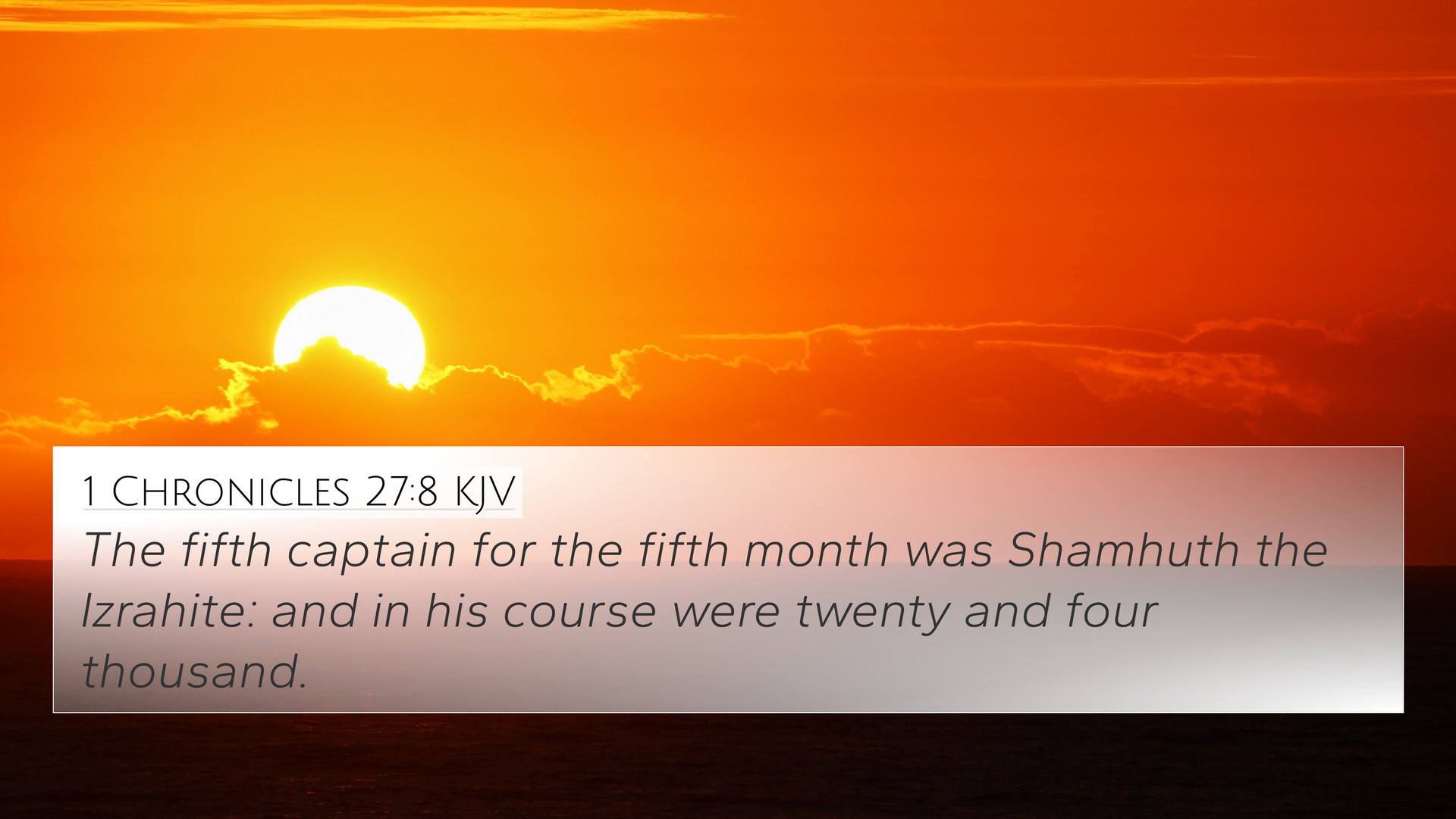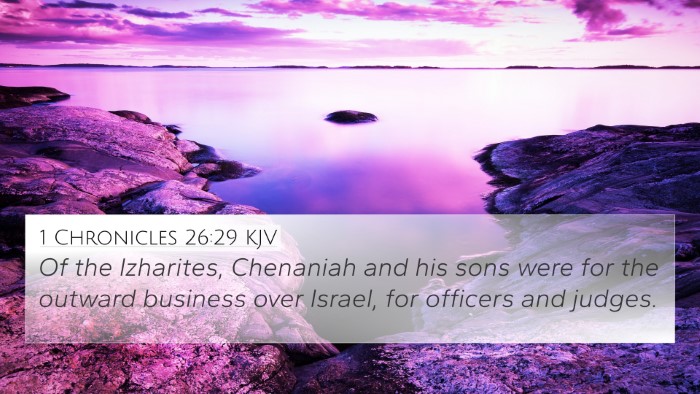Understanding 1 Chronicles 27:8
1 Chronicles 27:8 states, "The second captain of the second month was Dodai the Ahohite, and of his course were twenty and four thousand." This verse is part of a larger enumeration of David's military leaders, reflecting on the organization of his army during his reign. To properly grasp the significance of this verse, we can explore its meanings through various commentaries, coupled with thematic Bible verse connections.
Commentary Insights
Matthew Henry's Commentary:
According to Matthew Henry, this enumeration of military captains shows the order and structure maintained by David to secure his kingdom. The captain mentioned, Dodai, represents both loyalty and capability, highlighting that such leaders were integral for maintaining the strength of Israel. This also implies a divine order in the appointment of leaders, emphasizing the importance of military preparedness in spiritual wisdom.
Albert Barnes' Notes:
Albert Barnes points out the month-by-month rotation system established by David to ensure that there was always a capable leader in place. This speaks to the significance of organization and accountability in leadership. Dodai, whose name means 'beloved,' signifies the favor and support that God grants to those chosen for leadership roles in His service.
Adam Clarke's Commentary:
Adam Clarke elaborates that the captains were not only responsible for military tasks but also acted as judges and leaders within their territories. This shows that leadership in Israel was multi-faceted, highlighting the need for discernment and wisdom, which is vital for effective governance.
Theological Implications
This verse beautifully illustrates the expansive theme of leadership in the Bible. It invites deeper understanding regarding the roles of military leaders, emphasizing that such positions are ordained by God and should reflect His divine purpose.
Cross-References
- 2 Samuel 23:9-10: Refers to the exploits of David's mighty men, demonstrating the honor associated with military leadership.
- 1 Chronicles 11:10: Emphasizes the role of David's mighty men, illustrating the loyalty and prowess of those appointed by David.
- 1 Chronicles 12:1-2: Provides context for those who joined David, illustrating characteristics of effective military leaders.
- 1 Chronicles 28:1: Further discusses David's organization of Israel's leadership.
- 2 Samuel 8:15: Highlights David's reign over Israel, confirming the importance of appointed leaders.
- Psalm 78:72: Speaks to the leadership qualities exhibited by David, important for God's people.
- Ecclesiastes 4:9-10: Discusses the merit in working together in unity, an important principle for leadership.
- Titus 1:5: Provides New Testament insight into appointing leaders in the church, akin to military leadership in Israel.
- 1 Peter 5:2-3: Encourages shepherding God's flock willingly and eagerly, paralleling the qualities of biblical leaders.
- Philippians 1:27: Encourages believers to conduct themselves in a manner worthy of the gospel, pertinent for leaders.
Inter-Biblical Dialogue
1 Chronicles 27:8 establishes inter-Biblical dialogue regarding effective leadership. The themes of order, discipline, and divine appointment resonate throughout the entire Bible. By paralleling Dodai's leadership with the criteria set forth in the New Testament for appointing church leaders, the continuity of God’s instructions for leadership across both Testaments becomes evident.
Practical Applications
Reflecting on this verse provides significant applications for contemporary believers:
- Leadership Integrity: Emphasizing the importance of godly characteristics in any leadership role.
- Structure and Order: Understanding the benefits of organized systems within ministry and community.
- Faithfulness in Service: Cultivating a heart of service and willingness to lead as exemplified by biblical figures.
- God’s Sovereignty: Recognizing that God appoints leaders for His divine purposes.
Conclusion
1 Chronicles 27:8 is a powerful lesson in leadership that resonates throughout scripture. It invites deeper study of the connections between Bible verses, urging believers to explore and understand the divine orchestration in the assignments given to leaders. The connections with various themes illustrate a masterful narrative that unifies the teaching of the Old and New Testaments.
By utilizing Bible cross-reference tools, readers can delve further into the patterns of leadership and governance outlined across the biblical text, fostering a broader understanding of God's intention for leaders and their responsibilities in His kingdom.





